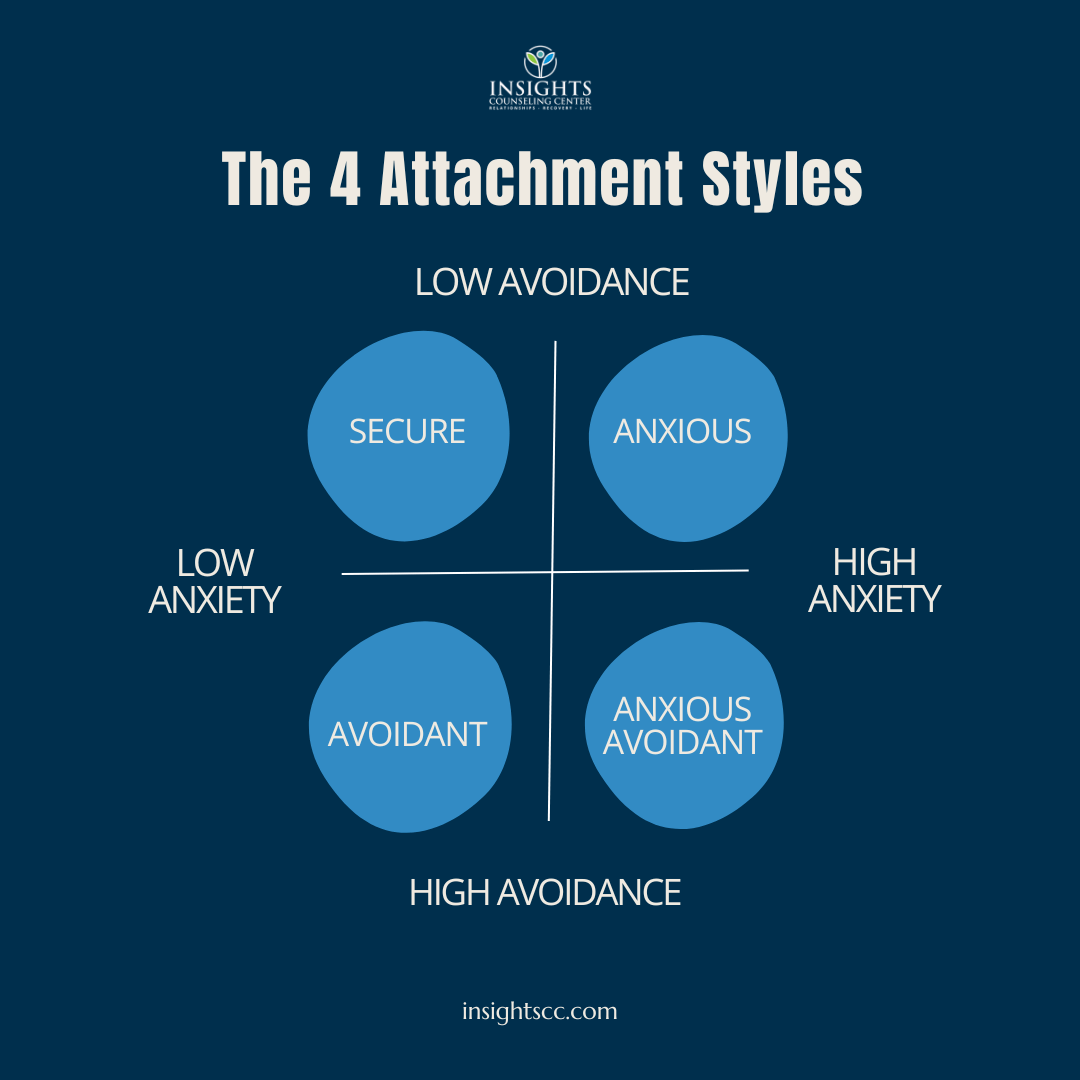Understanding Attachment Styles in Marriage: Discovering the Keys to Healthy Relationships
In the journey of marriage, we embark on a lifelong exploration of love, trust, and connection. Yet, sometimes we find ourselves grappling with patterns of behavior that leave us feeling disconnected or misunderstood. It is in these moments that understanding our attachment styles becomes helpful. Attachment styles are deeply ingrained patterns of relating to others that influence how we form and maintain relationships. By delving into the four attachment styles, we can gain insight into our own behaviors and those of our partners, fostering understanding and ultimately building stronger, more resilient marriages.
Secure Attachment Style
The secure attachment style serves as an anchor for healthy relationships, showcasing a balance of independence and emotional intimacy. Individuals with a secure attachment style exhibit trust, effective communication, and an ability to seek support when needed. In a marriage, this style can be exemplified through openly expressing emotions, providing comfort and reassurance during difficult times, and maintaining a sense of connection even during periods of stress or disagreement. Partners who are securely attached create an environment that fosters security, allowing the relationship to thrive even in challenging circumstances.
Example: A couple practices active listening, empathizing with one another's feelings, and openly discussing their fears and concerns. They provide reassurance and support during difficult times, strengthening the bond of trust and understanding between them.
Avoidant Attachment Style
Individuals with an avoidant attachment style often prioritize independence and self-reliance over emotional intimacy. They may struggle with vulnerability and find it challenging to trust and depend on others. In a marriage, this style can manifest as an emotional distance, a fear of being engulfed or controlled, and difficulty in expressing needs and emotions. Partners with an avoidant attachment style may prioritize individual pursuits over the needs of the relationship, leading to feelings of neglect or rejection.
Example: A partner with an avoidant attachment style tends to retreat emotionally when conflicts arise, placing distance between themselves and their spouse. They may become hesitant to share their feelings and needs, causing their partner to feel shut out and emotionally disconnected.
Anxious Attachment Style
Those with an anxious attachment style crave close emotional connections but may also harbor worries about rejection and abandonment. In a marriage, individuals with this style may be highly attuned to their partner's mood and may exhibit a fear of abandonment, leading to clinginess or overdependence on their spouse. They may constantly seek reassurance and validation, often interpreting ambiguous signals as signs of rejection.
Example: A partner with an anxious attachment style may become easily overwhelmed by doubts and insecurities, seeking constant reassurance from their spouse. They may struggle with regulating their emotions, leading to heightened tension and frequent arguments over perceived slights or inattentiveness.
Disorganized Attachment Style
The disorganized attachment style is characterized by conflicting emotions and behaviors, resulting from unresolved trauma or inconsistent caregiving experiences in childhood. In a marriage, individuals with a disorganized attachment style may exhibit a mix of anxious and avoidant behaviors, which can lead to confusion and instability within the relationship. They may struggle with maintaining emotional stability and may find it challenging to trust and connect with their partner fully.
Example: A partner with a disorganized attachment style may display unpredictable and inconsistent behaviors, alternating between extreme emotional intimacy and emotional withdrawal. This can create confusion and uncertainty within the marriage, as the non-linear patterns of behavior can be difficult to navigate.
Embarking on a Transformative Journey: Discovering the Path to Secure Attachment
Moving towards a secure attachment is not only possible but also a transformative journey that can bring immense joy and fulfillment to our lives and relationships. While our early attachment experiences lay the foundation for our attachment styles, research shows that individuals have the potential to develop a secure attachment style later in life. According to studies, about 40-50% of adults with an insecure attachment style can transition to a more secure attachment style through therapy and intentional efforts to create healthier relational patterns. This powerful statistic highlights the resilience and capacity within all of us to heal, grow, and foster stronger emotional connections.
By seeking therapy and working with skilled professionals, individuals can gain self-awareness, understanding, and tools to address deep-seated patterns of attachment. Through compassionate guidance and support, individuals can learn to navigate their emotions, communicate more effectively, and develop a greater sense of trust. Therapeutic interventions such as Cognitive-Behavioral Therapy (CBT), Emotionally Focused Therapy (EFT), and Attachment-Based Interventions like the Psychobiological Approach to Couple Therapy (PACT) have shown promising results in helping individuals cultivate more secure attachment styles.
It is important to remember that the journey toward a secure attachment style is unique to each individual and may require time, patience, and ongoing self-reflection. But with dedication and the guidance of an empathetic therapist, individuals can experience profound transformation, rewiring the pathways of their relationships and cultivating deeper emotional intimacy.
At Insights Counseling Center, we understand the deep longing for healthy, secure relationships. We are here to offer you the tools, guidance, and unwavering support needed to embark on this empowering journey of healing. Together, we can discover the path to a secure attachment and create a foundation of love, trust, and resilience that will fortify your relationships and allow you to thrive. Restore your relationships in couples therapy and recover your life – we are honored to be your companions on this transformative journey. Reach out today to schedule an appointment.

